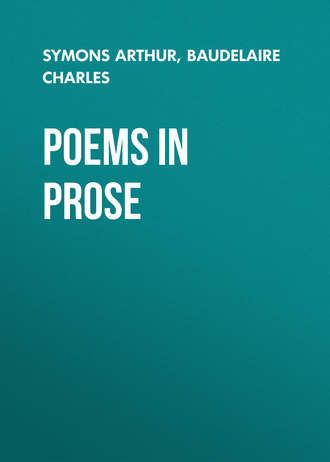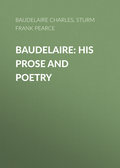
Baudelaire Charles
Poems in Prose
V
Windows
He who looks in through an open window never sees so many things as he who looks at a shut window. There is nothing more profound, more mysterious, more fertile, more gloomy, or more dazzling, than a window lighted by a candle. What we can see in the sunlight is always less interesting than what goes on behind the panes of a window. In that dark or luminous hollow, life lives, life dreams, life suffers.
Across the waves of roofs, I can see a woman of middle age, wrinkled, poor, who is always leaning over something, and who never goes out. Out of her face, out of her dress, out of her attitude, out of nothing almost, I have made up the woman's story, and sometimes I say it over to myself with tears.
If it had been a poor old man, I could have made up his just as easily.
And I go to bed, proud of having lived and suffered in others.
Perhaps you will say to me: "Are you sure that it is the real story?" What does it matter, what does any reality outside of myself matter, if it has helped me to live, to feel that I am, and what I am?
VI
Crowds
It is not given to every man to take a bath of multitude: to play upon crowds is an art; and he alone can plunge, at the expense of humankind, into a debauch of vitality, to whom a fairy has bequeathed in his cradle the love of masks and disguises, the hate of home and the passion of travel.
Multitude, solitude: equal terms mutually convertible by the active and begetting poet. He who does not know how to people his solitude, does not know either how to be alone in a busy crowd.
The poet enjoys this incomparable privilege, to be at once himself and others. Like those wandering souls that go about seeking bodies, he enters at will the personality of every man. For him alone, every place is vacant; and if certain places seem to be closed against him, that is because in his eyes they are not worth the trouble of visiting.
The solitary and thoughtful walker derives a singular intoxication from this universal communion. He who mates easily with the crowd knows feverish joys that must be for ever unknown to the egoist, shut up like a coffer, and to the sluggard, imprisoned like a shell-fish. He adopts for his own all the occupations, all the joys and all the sorrows that circumstance sets before him.
What men call love is small indeed, narrow and weak indeed, compared with this ineffable orgie, this sacred prostitution of the soul which gives itself up wholly (poetry and charity!) to the unexpected which happens, to the stranger as he passes.
It is good sometimes that the happy of this world should learn, were it only to humble their foolish pride for an instant, that there are higher, wider, and rarer joys than theirs. The founders of colonies, the shepherds of nations, the missionary priests, exiled to the ends of the earth, doubtless know something of these mysterious intoxications; and, in the midst of the vast family that their genius has raised about them, they must sometimes laugh at the thought of those who pity them for their chaste lives and troubled fortunes.
VII
The Cake
I was travelling. The landscape in the midst of which I was seated was of an irresistible grandeur and sublimity. Something no doubt at that moment passed from it into my soul. My thoughts fluttered with a lightness like that of the atmosphere; vulgar passions, such as hate and profane love, seemed to me now as far away as the clouds that floated in the gulfs beneath my feet; my soul seemed to me as vast and pure as the dome of the sky that enveloped me; the remembrance of earthly things came as faintly to my heart as the thin tinkle of the bells of unseen herds, browsing far, far away, on the slope of another mountain. Across the little motionless lake, black with the darkness of its immense depth, there passed from time to time the shadow of a cloud, like the shadow of an airy giant's cloak, flying through heaven. And I remember that this rare and solemn sensation, caused by a vast and perfectly silent movement, filled me with mingled joy and fear. In a word, thanks to the enrapturing beauty about me, I felt that I was at perfect peace with myself and with the universe; I even believe that, in my complete forgetfulness of all earthly evil, I had come to think the newspapers are right after all, and man was born good; when, incorrigible matter renewing its exigences, I sought to refresh the fatigue and satisfy the appetite caused by so lengthy a climb. I took from my pocket a large piece of bread, a leathern cup, and a small bottle of a certain elixir which the chemists at that time sold to tourists, to be mixed, on occasion, with liquid snow.
I was quietly cutting my bread when a slight noise made me look up. I saw in front of me a little ragged urchin, dark and dishevelled, whose hollow eyes, wild and supplicating, devoured the piece of bread. And I heard him gasp, in a low, hoarse voice, the word: "Cake!" I could not help laughing at the appellation with which he thought fit to honour my nearly white bread, and I cut off a big slice and offered it to him. Slowly he came up to me, not taking his eyes from the coveted object; then, snatching it out of my hand, he stepped quickly back, as if he feared that my offer was not sincere, or that I had already repented of it.
But at the same instant he was knocked over by another little savage, who had sprung from I know not where, and who was so precisely like the first that one might have taken them for twin brothers. They rolled over on the ground together, struggling for the possession of the precious booty, neither willing to share it with his brother. The first, exasperated, clutched the second by the hair; and the second seized one of the ears of the first between his teeth, and spat out a little bleeding morsel with a fine oath in dialect. The legitimate proprietor of the cake tried to hook his little claws into the usurper's eyes; the latter did his best to throttle his adversary with one hand, while with the other he endeavoured to slip the prize of war into his pocket. But, heartened by despair, the loser pulled himself together, and sent the victor sprawling with a blow of the head in his stomach. Why describe a hideous fight which indeed lasted longer than their childish strength seemed to promise? The cake travelled from hand to hand, and changed from pocket to pocket, at every moment but, alas, it changed also in size; and when at length, exhausted, panting and bleeding, they stopped from the sheer impossibility of going on, there was no longer any cause of feud; the slice of bread had disappeared, and lay scattered in crumbs like the grains of sand with which it was mingled.





